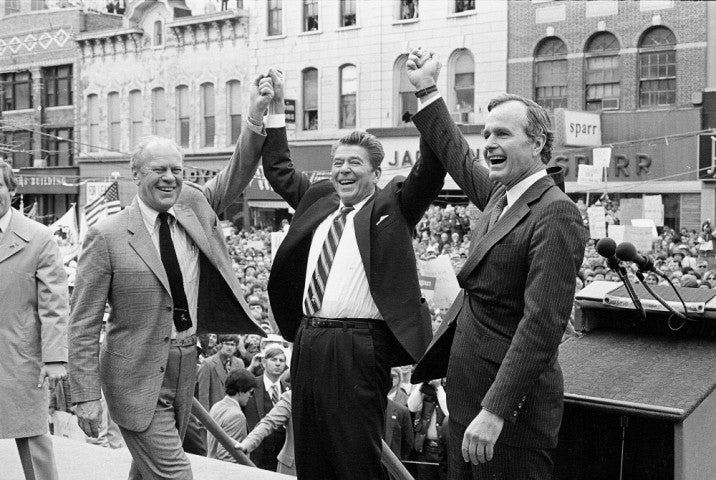US Election 2016: How the Republicans, party of Abraham Lincoln, could end up with Donald Trump
By today’s standards, the unyielding Ronald Reagan was a moderate

Your support helps us to tell the story
From reproductive rights to climate change to Big Tech, The Independent is on the ground when the story is developing. Whether it's investigating the financials of Elon Musk's pro-Trump PAC or producing our latest documentary, 'The A Word', which shines a light on the American women fighting for reproductive rights, we know how important it is to parse out the facts from the messaging.
At such a critical moment in US history, we need reporters on the ground. Your donation allows us to keep sending journalists to speak to both sides of the story.
The Independent is trusted by Americans across the entire political spectrum. And unlike many other quality news outlets, we choose not to lock Americans out of our reporting and analysis with paywalls. We believe quality journalism should be available to everyone, paid for by those who can afford it.
Your support makes all the difference.How did it come to this – that America’s Republicans, the party of Abraham Lincoln, who ended slavery and saved the Union, now risk splitting in two, amid the very real possibility that they will nominate a bigoted showman populist of little conservative conviction as their candidate for the White House in 2016?
The Republicans are indeed the Grand Old Party. They started life in the mid-1850s, committed to the modernisation of the US economy and in opposition to an act that would extend slavery into Kansas and Nebraska. Lincoln’s achievements gave the Republicans a moral authority and a dominance of American politics that lasted, with a few interruptions, until the Great Depression.
Along the way they produced two other notable presidents: William McKinley, and Theodore Roosevelt. The Republicans were – and remain – the party of business and high finance. But they were also the party of northern workers, farmers and black people.
In the second half of the 20th century, however, there began a shift to the right in which evangelical Christians and hardline social conservatives emerged as pillars of the party. Support among black people has all but vanished. The party has little appeal for women, for Hispanics and other minorities.
Increasingly, it is old and white, fearful and xenophobic, a fragile coalition of an Establishment backed by a relatively moderate but less influential business wing, and an angry base which feels that the Republicans they sent to Congress have betrayed them. The emergence of Donald Trump has brought tension within that uneasy alliance close to breaking point.
The reinvention of the party began, it can be argued, with Richard Nixon’s “southern strategy”, aimed at turning southern Democrats who resented Lyndon Johnson’s civil rights reform into Republicans. The strategy worked, and was embraced by Nixon’s successors. In good measure, it contributed to the Republican dominance of US politics for the following 40 years. But it helped sow the seeds of today’s looming schism.
Ronald Reagan is still regarded as the patron saint of the right. But by present day standards he was a moderate, whose unyielding rhetoric masked pragmatic realism. Reagan and his successor George H W Bush were ready to compromise, and make deals with their opponents. Today’s Republicans are not. But neither intransigence, nor the total control of Congress that was regained in 2014, has made much difference.
Obamacare remains the law of the land. Republicans have learnt the hard way that despite the promises of their leaders, unless you control the White House, or have a filibuster-proof majority of 60 seats in the Senate – six more than Republicans currently hold – you will achieve nothing.
Frustration at this state of affairs has fuelled the ascent of Trump, and a climate in which association with Washington, or governing experience at any level, is almost a badge of shame. Trump is not a conservative by Republican standards. He has few discernable beliefs other than in himself. Yet he is carrying all before him. Abraham Lincoln can only shudder in his grave.
Join our commenting forum
Join thought-provoking conversations, follow other Independent readers and see their replies
Comments